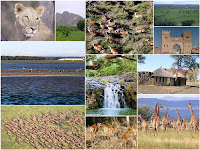Watch The Vision of Wangari Maathai
"It is the people who must save the environment. It is the people who must make their leaders change. And we cannot be intimidated. So we must stand up for what we believe in." Wangari Maathai
For any one who loves and cares for wildlife and the environment, the documentary: Taking Root - The Vision of Wangari Maathai is a must watch.
TAKING ROOT: The Vision of Wangari Maathai tells the story of Kenya’s Green Belt Movement, a grassroots organization encouraging rural women and families to plant trees in community groups, and follows Maathai, the movement’s founder and the first environmentalist and African woman to win the Nobel Prize. Maathai discovered her life's work by reconnecting with the rural women with whom she had grown up. They told her they were walking long distances for firewood, and that clean water was scarce. The soil was disappearing from their fields and their children were suffering from malnutrition. “Well, why not plant trees?” she suggested.
Maathai soon discovered that tree planting had a ripple effect of empowering change. In the mid-1980s, Kenya was under the repressive regime of Daniel arap Moi, whose dictatorship outlawed group gatherings and the right of association. In tending their nurseries, women had a legitimate reason to gather outside their homes and discuss the roots of their problems. They soon found themselves working against deforestation, poverty, ignorance, embedded economic interests and government corruption; they became a national political force that helped to bring down the country’s 24-year dictatorship.
Using archival footage and first-person accounts, the film documents dramatic political confrontations of 1980s and 1990s Kenya and captures Maathai's infectious determination and unwavering courage through in-depth conversations with the film’s subjects. TAKING ROOT captures a world view in which nothing is perceived as impossible. The film also presents an awe-inspiring profile of one woman's three-decade journey of courage to protect the environment, ensure gender equality, defend human rights and promote democracy—all sprouting from the achievable act of planting trees.PBS
If you haven't watched the movie, watch it. It's powerful, very inspiring and very interesting. It's an eye opener for any one who watches it.
And learn much more about the challenges facing Africa today from her books: the challenges facing Africa today are severe and wide ranging. Yet what we see of them in the media, more often than not, are tableaux vivantes connoting poverty, dependence, and desperation. Wangari Maathai presents a different vision, informed by her three decades as an environmental activist and campaigner for democracy. She illuminates the complex and dynamic nature of the continent, and offers "hard-headed hope" and "realistic options" for change and improvement. With clarity of expression, Maathai analyzes the most egregious "bottlenecks to development in Africa" occurring at the international, national, and individual levels—cultural upheaval and enduring poverty, among them—and deftly describes what Africans can and need to do for themselves, stressing all the while responsibility and accountability.


